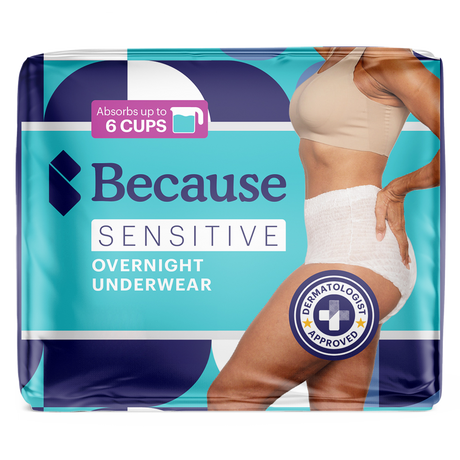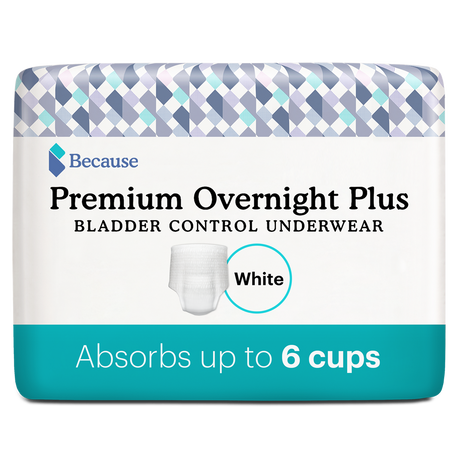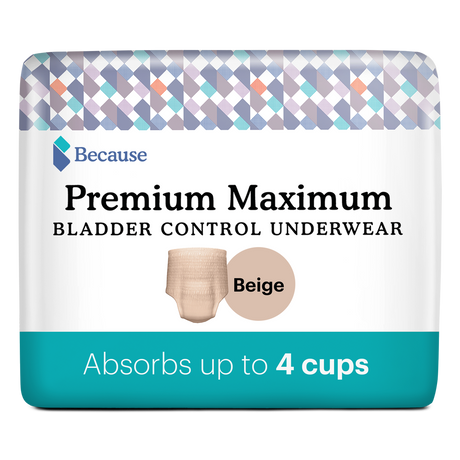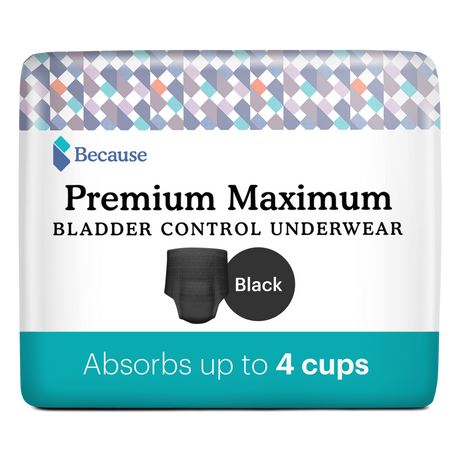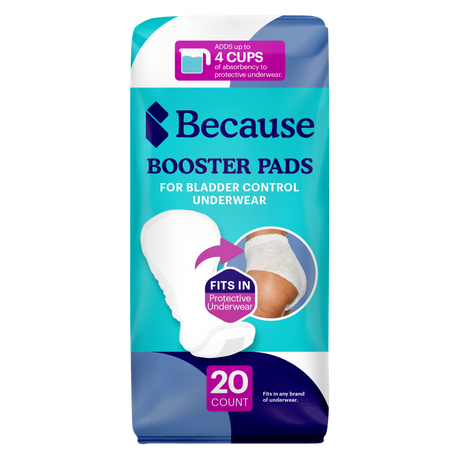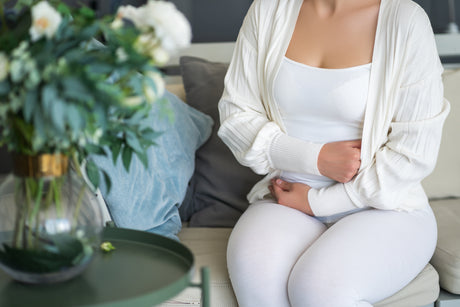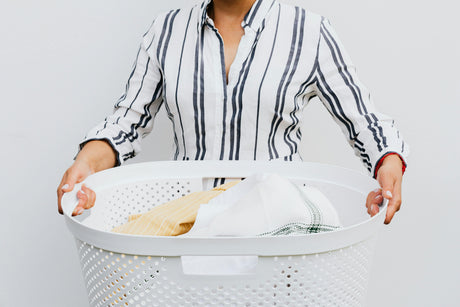For the 12% of the U.S. population that suffers from irritable bowel syndrome, or IBS, symptoms like abdominal pain, diarrhea, and constipation are ongoing problems. But do IBS patients experience incontinence, too? Read on to learn more about the potential connections between IBS and urinary incontinence.

Can IBS Cause Incontinence?
At this point, there isn’t enough evidence to say for certain that IBS is among the possible causes of urinary incontinence. There is little research on the subject, and the small study results that have been published have shown conflicting results. Studies from 2015 and 2021 both pointed to a possible connection between the two, but in others, researchers found that there wasn’t an association.
Even if research does establish a link between IBS and overactive bladder and other forms of urinary incontinence, the relationship may not mean that irritable bowel syndrome is the direct cause of the problem. It could be that IBS and incontinence have similar risk factors, leading to an overlap of people who have both conditions. There is also the possibility that there is an underlying medical condition that is responsible for both IBS symptoms and bladder problems that has yet to be identified.

Understanding Irritable Bowel Syndrome (IBS)
Irritable bowel syndrome, or IBS, is a common problem that affects the digestive tract. Other names for IBS include spastic colon, irritable colon, irritable bowel, and nervous stomach. Typical IBS symptoms may include:
- Abdominal pain
- Abdominal cramps and stomach cramps
- Bloating
- Gas
- More or less frequent bowel movements
- Constipation
- Diarrhea and loose stool
- Feeling like you can’t completely empty your bowels
- Changes in stools, such as lumpy or liquid stools
IBS symptom severity and frequency differ from person to person. For some people, symptoms of IBS are an ongoing part of daily life, while for others, they may occur for a few days, stop, and then return in the future.
Doctors don’t fully understand what causes IBS. Abnormal contractions of muscles in the intestine likely play a role, and it is thought that damage to the nerves and/or nervous system dysfunction may also contribute to IBS. Infections and damage to the digestive organs due to radiation therapy, gallbladder removal surgery, and other medical problems might also contribute to IBS.
To diagnose IBS, healthcare providers generally start by comparing a patient’s symptoms to the diagnostic criteria for IBS, gathering their medical history, and performing a physical examination. Then, they may order further tests like an X-ray or CT scan, a colonoscopy, and/or an upper endoscopy. Additional tests through blood work and stool samples might be used to rule out other problems like an infection, lactose intolerance, and other types of food intolerance.
There is no cure for IBS, but once a health care provider diagnoses someone with the condition, there are treatment options available to help manage symptoms long term. These can include dietary changes and prescription medications.

Types of Incontinence Associated with IBS
Certain types of incontinence are more commonly associated with IBS than others. These include all of the following.
Stress Incontinence
Stress incontinence is a form of incontinence marked by urine leakage that occurs when pressure is placed on the pelvic area, such as during exercise or when sneezing or coughing. Weakness of the pelvic floor muscles is generally the cause of the problem. These muscles are responsible for supporting the bladder and other parts of the lower urinary tract. When they grow weak, urine may be able to escape through the sphincter muscles that control the flow of urine.
In women, stress incontinence often occurs after pregnancy and childbirth. Men frequently develop incontinence due to prostate enlargement. Elderly people may also be more at risk for stress incontinence because of changes in muscles that occur with age.
Urge Incontinence
Urge incontinence is the term for types of incontinence that cause a sudden, urgent need to urinate. Overactive bladder falls into this category and involves both urinary urgency and frequency.
In people with urge incontinence, the muscles of the bladder contract abnormally. Nerve damage due to radiation treatment, medical conditions, and injuries are common causes of urge incontinence.
Bowel Incontinence
Also called fecal incontinence or faecal incontinence, bowel incontinence is the term for accidental bowel leakage (ABL), which can be mild or severe. It can occur when the anal sphincter muscle doesn’t hold poop in or, or it can be due to abnormal contractions or blockages in the large intestines because of nerve damage or a medical condition.
The Relationship Between IBS and Incontinence
There are a number of potential reasons why individuals with IBS may be prone to incontinence. Let’s take a look at each of them.
Weakened Pelvic Floor Muscles
As previously mentioned, weakened pelvic floor muscles lead to symptoms of stress incontinence. Feces in the rectum can apply pressure to the muscles, increasing the risk of urine leaks. In addition, weakened pelvic floor muscles may also be associated with weak anal muscles that could lead to a loss of bowel control.
Sensitivity to Sensation
There is some evidence to suggest that people who have IBS may be more sensitive to sensations than other individuals. Experts who support this theory believe that those with irritable bowel syndrome may perceive the urge to urinate as being more intense than it actually is, and that this could be the reason for the connection between IBS and overactive bladder.
Abnormal Transit Time
With some forms of IBS, food passes through the digestive tract and into the anal canal at a faster than average pace. This abnormal transit time can mean that a person needs to defecate soon after eating, and in some cases, the urge to pass a bowel movement may be strong. The urgency and suddenness can be causes of bowel incontinence.
Emotional and Psychological Factors
People with IBS often experience a worsening of symptoms during periods of emotional stress. Some studies have also established an association between anxiety and overactive bladder. As a result, it’s possible that the same emotional factors that trigger IBS symptoms may also contribute to incontinence, but more research is necessary to fully explore this connection.

IBS Subtypes and Their Connection to Incontinence
There are four main subtypes of IBS. Each type has its own set of symptoms and may be associated with incontinence in different ways. Read on to learn more about each subtype.
IBS-D
Recurrent abdominal pain and diarrhea are the defining symptoms of IBS-D. Loose bowels associated with this form of IBS can increase the risk of feces leaking through the anus.
IBS-C
People with IBS-C experience chronic constipation and abdominal discomfort. The buildup of solid stool could put pressure on the bladder and lead to stress incontinence.
IBS-M
Individuals with IBS-M experience alternating bouts of diarrhea and constipation as well as ongoing abdominal pain. Since they have symptoms of both IBS-D and IBS-C, they may experience stress incontinence and fecal incontinence.
IBS-U
With IBS-U, symptoms vary widely, and there isn’t any defining pattern to them the way that there is with IBS-M. People with this subtype may experience fecal incontinence and stress incontinence that coincides with the onset of their IBS symptoms.

How to Manage IBS-Related Incontinence and Overactive Bladder
Trouble with IBS and incontinence symptoms may persist throughout your life, but the good news is that there are things you can do to manage these conditions. Following these tips is a good starting point for improving your quality of life and potentially controlling symptoms.
Use the Right Incontinence Products
Incontinence products can reduce the risk of skin irritation and protect you from accidents. There are two main categories of products that you can incorporate into your daily routine: incontinence protection and skin care products.
Incontinence Protection
Incontinence protection products include absorbent pads and incontinence underwear (also called adult diapers). You can purchase them over-the-counter, but at times doctors may also prescribe them as medically necessary for people with IBS and incontinence.
When selecting products, it’s important that you choose an option that is the right absorbency level for you. For stress incontinence and mild overactive bladder, moderate absorbency products may be ideal. People with fecal incontinence and more severe urinary incontinence may require more absorbent maximum or overnight products. If you find that you still experience leaks even when using the strongest absorbency, booster pads worn with incontinence underwear can provide a solution.
Skin Care
Proper skin care can lower the likelihood of experiencing incontinence odors and skin irritation. Whenever you change your incontinence protection, cleanse your skin thoroughly with a mild product like a cleansing spray or cleansing wipes. Then, apply a barrier cream to protect your skin from urine and feces. If irritation does occur, you can use a skin relief cream to ease discomfort during the healing process.

Modify Your Diet and Prioritize Hydration
Diet changes can play an important role in the management of both incontinence and IBS.
Often, healthcare providers recommend that people with IBS follow the low-FODMAP diet to reduce their intake of certain types of carbohydrates that can be more difficult to digest. Foods that you may need to cut back on or avoid while on a low-FODMAP diet include dairy products, wheat, certain fruits and vegetables like apples and garlic, high fructose corn syrup, legumes, and some types of nuts like pistachios and cashews.
Certain foods can also trigger bladder inflammation and worsen urinary incontinence symptoms. Caffeine, alcohol, acidic foods like citrus fruit, fatty foods like fried foods and fast food, and spicy foods like chili peppers and curry are some common bladder irritants.
Drinking enough water and other fluids on a daily basis can reduce the risk of constipation and benefit your urinary system. Your healthcare provider can help you determine how much fluid you should have daily.
Consider Bladder Health Supplements
Pumpkin seed and soy germ supplements like Because Bladder Control Daily Supplement may strengthen the bladder muscles to reduce the risk of urine leakage and ease symptoms of urinary urgency.
Strengthen Your Pelvic Floor Muscles
Pelvic floor muscle exercises can help tone and strengthen your pelvic floor to reduce the risk of accidents due to fecal and urinary incontinence. Kegel exercises are one of the most commonly recommended types of pelvic floor-strengthening exercises. You can find online videos that demonstrate the proper Kegel technique, and physical therapists can also teach you additional pelvic floor exercises that you can do at home to support stronger muscles over time.
Establish a Regular Toilet Routine
Modifying your bladder and bowel habits can make a difference in incontinence symptoms. Your healthcare provider may recommend that you visit the bathroom on a set schedule, regardless of whether or not you feel the urge to go. Over time, this bladder and bowel training can cause your body to positively adapt so that you feel less urgency and are less likely to experience leaks.
Employ Stress Management Techniques and Seek Emotional Support
Because both IBS and overactive bladder may be tied to stress, finding ways to relax and unwind are an important part of managing these conditions. For example, you might try breathing techniques, mindfulness, meditation, or yoga to de-stress.
Seeking emotional support can also help you deal with stress and anxiety. Reach out to trusted loved ones and be open about your struggles and symptoms. You might also benefit from talking to a mental health professional who can help you develop healthy coping strategies.
Talk to Your Doctor
The information shared in this post is no substitute for a doctor’s advice. If you have IBS and incontinence, talk to your healthcare provider about the group of symptoms that you experience. There are many potential treatments for incontinence from sacral nerve stimulation to prescription medication to urethra or anal surgery, and the right treatment for one person may not be the same for another.
Your healthcare provider can help you determine what the best treatment is for your unique situation, monitor your progress, and modify your treatment plan as needed. Schedule an appointment with your doctor and take the first step toward getting on a treatment program.
Do you struggle with IBS and incontinence? Take our bladder protection quiz and get a sample pack to try.
Sources:
National Institute of Diabetes and Digestive and Kidney Diseases (NIDDK). (n.d.). Irritable bowel syndrome (IBS): Definition & facts. Retrieved from https://www.niddk.nih.gov/health-information/digestive-diseases/irritable-bowel-syndrome/definition-facts
Mearin, F., Lacy, B. E., et al. (2015). Bowel disorders. BMC Gastroenterology, 15(Suppl 1), 1-23. doi: 10.1186/s12876-015-0296-0
Aguirre, E., Pitta, F., et al. (2021). Health-related quality of life in irritable bowel syndrome patients: A systematic review and meta-analysis. International Urology and Nephrology, 53(2), 263-272. doi: 10.1007/s11255-021-03044-w
Drossman, D. A., Hasler, W. L., et al. (2018). Rome IV-functional GI disorders: Disorders of gut-brain interaction. Gastroenterology, 150(6), 1257-1261. doi: 10.1053/j.gastro.2017.08.063
Labus, J. S., Osadchiy, V., et al. (2017). Symptoms and visceral perception in patients with pain-predominant irritable bowel syndrome. American Journal of Gastroenterology, 112(1), 60-70. doi: 10.1038/ajg.2016.481

